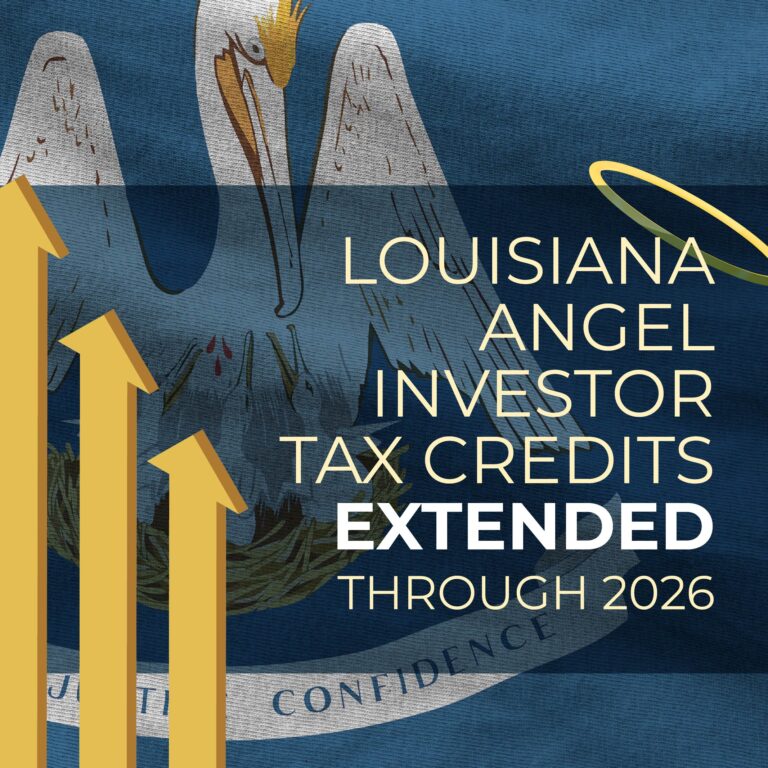Over the past year, Louisiana has taken major strides to improve its business climate for entrepreneurs and early-stage companies. Informed by the needs of founders, investors and economic developers across the state, lawmakers and state agencies have enacted a slate of reforms aimed at unlocking capital, reducing tax burdens and incentivizing innovation.

Two policies in particular — the extension of the Angel Investor Tax Credit (AITC) and reforms to the federal Qualified Small Business Stock (QSBS) exclusion — are already reshaping how capital flows into Louisiana-based ventures. At the same time, Governor Jeff Landry and Louisiana Economic Development (LED) have made it clear that rural communities and small businesses are a strategic priority. Nowhere is this more evident than in North Louisiana, where startup activity is rising, and local angel groups are stepping in to fuel the next generation of high-growth companies.
Expanded Angel Investor Tax Credit Drives Local Investment
Earlier this year, the Louisiana Legislature passed HB665, signed into law as Act 515, which extends and enhances the state’s Angel Investor Tax Credit program through June 30, 2026. The AITC has long served as a foundational tool for early-stage companies seeking equity financing. With Act 515, it has become more founder- and investor-friendly than ever before. The bill was sponsored by Representative Matthew Willard (D) of House District 97 and received Senate support from Revenue and Fiscal Affairs Committee Chair Senator Franklin J. Foil (R) of District 16.
Among the most notable updates, Louisiana’s enhanced Angel Investor Tax Credit now delivers the full credit in a lump sum, significantly improving investor liquidity and making the program more attractive to angel investors and high-net-worth individuals. Rural areas, meaning parishes with a total population less than 50,000 residents, were also added to the 35 percent AITC previously designated only for Opportunity Zones, directing much-needed capital to historically underserved areas like North and Central Louisiana. In addition, startup eligibility has been aligned with LED’s targeted industry sectors, ensuring the incentive supports businesses positioned to drive long-term economic growth across the state.
Act 515 also introduces robust new reporting requirements, helping LED and stakeholders better understand the economic impact of angel-backed startups. Participating businesses must now report employee headcount, payroll figures, federal grant or contract wins, partnerships with Louisiana colleges, and more, bringing greater transparency and accountability to the program.
Federal QSBS Reform Makes Startups More Attractive to Investors
At the federal level, changes to Section 1202 of the Internal Revenue Code, enacted as part of HR1, provide additional incentives for investing in qualified small businesses.
These federal reforms to Qualified Small Business Stock (QSBS) have made investing in startups more attractive by expanding capital gains exclusions and increasing eligibility thresholds. These changes offer investors greater flexibility and potential for significant tax savings when holding stock in qualifying businesses over various timeframes. It is always important to note that investors should consult their tax and investment advisors to fully understand how these updates to QSBS rules may apply to their specific situation.
These changes make Louisiana startups, especially those with strong growth potential, more appealing to long-term investors. Combined with state-level incentives like the AITC, Louisiana is emerging as one of the most capital-friendly places in the South to launch and scale a business.
Angel Networks Advocate and Accelerate Statewide Growth
Behind the scenes, much of this progress has been championed by Louisiana’s growing network of angel investor groups. Organizations such as the New Louisiana Angel Fund (NLAF), Red Stick Angels and Gulf South Angels have played a vital role in advocating for tax credit reforms, streamlining investment pathways and connecting promising startups with early-stage capital.
These funds don’t just deploy capital; they serve as a bridge between policy and practice. They engage lawmakers, collaborate with LED, and provide feedback on how state incentives can be structured to drive maximum impact and return for our region.
These new initiatives help make the risk of investing in startups more manageable — and when more capital flows in, more companies can grow right here in Louisiana. Together, these angel groups are reshaping the state’s entrepreneurial landscape. From tech startups in Shreveport and Monroe to biotech companies in Baton Rouge and Lafayette, they are empowering founders to build, launch and scale here in Louisiana.
Driving Growth in North Louisiana: Focus from Governor Landry and LED
Since taking office, Governor Landry has emphasized the importance of job creation, private investment and rural economic development. Working closely with LED, his administration has prioritized programs that support business formation in underserved regions.
North Louisiana has emerged as a key focal point. With a strong base of research institutions, growing angel support and proximity to affordable logistics infrastructure, the region is well-positioned to become a hub for small business growth. Enhanced state and federal tax tools are only accelerating this trend.
Policy reforms alone don’t build businesses — but they do shape the environment in which entrepreneurship can flourish. With the AITC extended and modernized, QSBS reforms in place, and permanent federal R&D credits secured, Louisiana is sending a clear signal: startups are welcome here, and investors are rewarded for backing them. Combined with strong angel network engagement and leadership from the Governor’s office and LED, Louisiana’s startup ecosystem is poised for its next chapter.

